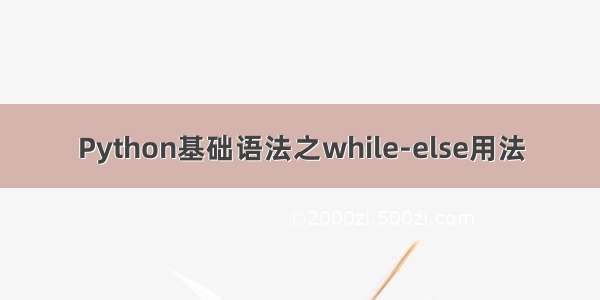
lucky_num = 19
#首先定义一个幸运数字,这样条理比较清晰
#action = True
guess_count = 0
while guess_count < 3:
#限制用户输入
input_num = int(input("Input the guess num: "))
#if lucky_num == input_num:
#print("Bingo!")
#action = False
#break强制终端循环语句,避免陷入死循环之中
if input_num > lucky_num:
print("The real number is smalller!")
elif input_num < lucky_num:
print("The real number is bigger...")
else:
print("Bjngo!...")
break
guess_count += 1
else:
print("Too many retrys!")
首先我们执行三次没有测对的情况如下:
Input the guess num: 1
The real number is bigger...
Input the guess num: 2
The real number is bigger...
Input the guess num: 100
The real number is smalller!
Too many retrys!
从结果上可以看出,最后执行了else分支语句(Too many retrys!),提示用户输入过多的次数,正常情况下是执行else语句的。下面我们来看
一下非正常退出情况下:
用户猜测正确:
Input the guess num: 1
The real number is bigger...
Input the guess num: 19
Bjngo!...
从上面结果我们可以看出,当用户猜对数字后,break了一下,推出了while...else语句,else语句没有正常执行。
2.return情况#首先定义一个幸运数字,这样条理比较清晰
#action = True
#限制用户输入,如果三次没有猜对则退出循环
def count():
lucky_num = 19
guess_count = 0
while guess_count < 3:
input_num = int(input("Input the guess num: "))
#if lucky_num == input_num:
#print("Bingo!")
#action = False
#break强制终端循环语句,避免陷入死循环之中
if input_num > lucky_num:
print("The real number is smalller!")
elif input_num < lucky_num:
print("The real number is bigger...")
else:
print("Bjngo!...")
return guess_count
guess_count += 1
else:
print("Too many retrys!")
numbers = count()print(numbers)
















